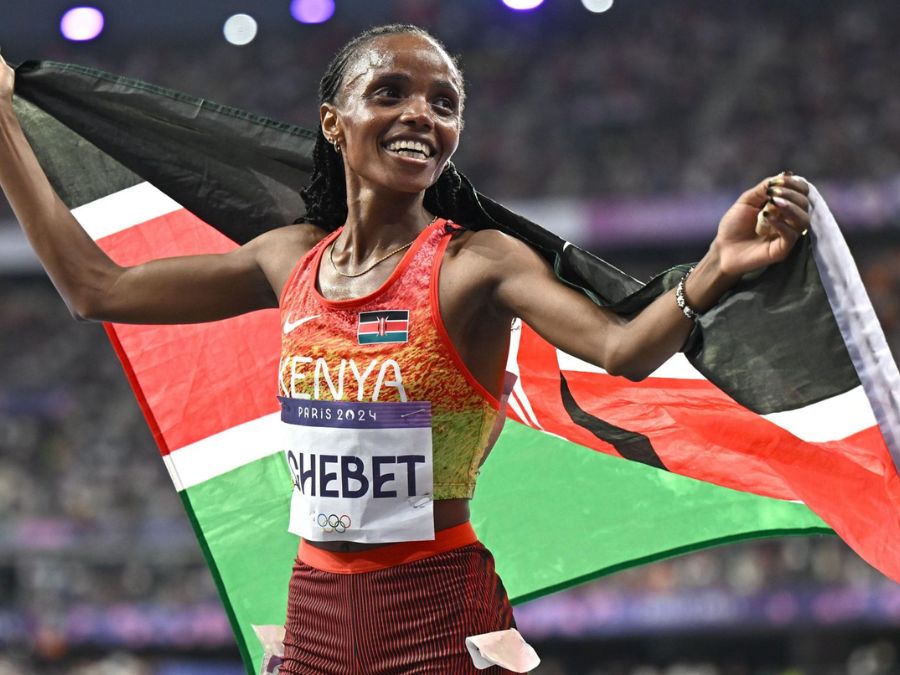If you prefer your dramas to be of the drawn-out variety, Friday night 9 August 2024 in the Stade de France was the night for you.
The 10,000 meters might be attenuated drama by its very nature, but 25 laps leading to a margin of victory of just one-tenth of a second? If that doesn’t raise the hairs on the back of your neck, check your vital signs.
But the men’s triple jump and women’s shot put went back-and-forth, forth-and-back for nearly two hours. The putters also had to contend with a slippery throwing circle as a result of a downpour early in the session. The heptathlon went down to the final event before the destiny of the medals became clear.

And, yes, four events were decided in less than a minute. Even there, however, there were the usual dramatics of 4×100 relay baton exchanges, the breaking of a long-standing Olympic record and the end of a long wait to step up to the top of the dais.
We’re runners, right? And your correspondent has never met a 10,000 metres race he hasn’t liked. There was one I thought I didn’t appreciate until 24 of the 25 laps had been run, but then it turned out OK as well.
But the women’s 10,000 had it all, a long, slow – tediously so at first – build-up to a shattering conclusion. Drama enough in that, but it was run against the backdrop of the contentious finish to the 5000 a few days earlier, won by Beatrice Chebet but also featuring a clash between Faith Kipyegon and Gudaf Tsegay which saw Kipyegon disqualified and then reinstated on appeal. Sifan Hassan then weighed in with some robust views on Tsegay’s racing tactics.
Kipyegon has her 1500 final to make up for her silver in the 5000 (Tsegay is in that, too). But Chebet, Tsegay and Hassan all featured in a 10,000 which ended with Chebet clinching a track distance double, matching Hassan’s effort in Tokyo three years ago.
After a first half run in just under 15:50, the pace still did not pick up considerably. Even as a pack of around a dozen women entered the final 1000 metres together, the twenty-third lap was covered in 71.33, the next in 68.69. In such a crowd of contenders, position in the pack was paramount. The Kenyan trio – Chebet, Margaret Kipkemboi and Lilia Rengeruk – were doing the driving, Ethiopia’s Tsegay, Tsigie Gebrselama and Fotyen Tesfay in the passenger seats.
Then there was Italy’s Nadia Battocletti. Seemingly just hanging with the leaders, but she haung in, hung in and then emerged as a possible shock winner when she pulled out to challenge Chebet as they entered the final straight.
It took a 57.56 final 400 before Chebet could put her rival away. Her winning 30:43.25 was almost two minutes slowed than her world record 28:54.14 at this year’s Pre Classic. Hassan took third in 30:44.12 with Kipkemboi and Rengeruk next ahead of Tsegay. Lauren Ryan was a solid race to finish thirteenth in 31:13.25.
Multi-eventers like the 800 metres about as much as a session of root canal surgery at the dentist, but after six events of the heptathlon, the two-lapper was decisive. Katarina Johnson-Thompson had to beat two-time defending champion Nafi Thiam by around nine seconds to snatch the gold. Anna Hall of the US needed something close to her 2:02 personal best to leap into the bronze medal position.
Johnson-Thompson did her darndest, running a personal best, but Thiam clung close enough to win by 36 points and become the first Olympic multi-eventer – man or woman – to win three times in a row. Hall ran 2:04 to win the 800 but to no avail as Noor Vidts retained third overall to give Belgium two of the three medals.
The Men’s triple and women’s shot also ran the distance. Yemisi Ogunleye and Maddison-Lee Wesche both had first-round fouls as the shot putters struggled to come to terms with the conditions. Wesche, a former U20 world champion for New Zealand, took a 3cm lead, 19.58 to 19.58, in the second round.
That lead held until Ogunleye threw 19.73 in the fifth round only for the Kiwi to immediately snatch it back with 19.86. Ogunleye topped that with 20.00 on her last effort. Could Wesche again respond. It looked as if she may have when her final effort came down close to the 20m line. But it wasn’t close enough. Gold to Germany, silver to NZ.
The men’s triple could have been rebadged as the championships of the Cuban diaspora. The medals went to three former Cuba athletes after a contest which ebbed and flowed. Jordan Diaz Fortun, representing Spain, won in the end with a best of 17.86, two centimetres ahead of Spain’s Pedro Pichardo with Italy’s Andy Diaz Hernandez third with 17.64.
There was seven centimetres between the gold and silver medallists after Fortun reached 17.86 in the first round. Pichardo closed the gap to 2cm in the second round and it remained the margin throughout, Pichardo’s final attempt falling just five centimetres short.
Australia’s Connor Murphy finished twelfth.
It took just 46.46 seconds for Rai Benjamin to dethrone world record holder Karsten Warholm as Olympic champion in the 400 hurdles. The drama was in the ending of Bejamin’s long wait to ascend to the gold medal. Second in Tokyo when Warholm ran his fabulous 45.94, he was also second in Doha 2019 world championships, in 2022 and 2023.
Finally Benjamin is sitting on top of the world. Warholm took the silver and Alison Ds Santos the bronze.
Relay fans will know that the modern history of US men’s 4×100 is – like Neighbours – a continuing drama. Its latest manifestation came at the first changeover in the final when Christian Coleman overran Kenny Bendarek. Just as in Eugene in 2022, an Andre De Grasse-anchored Canada raced to the gold medal ahead of South Africa and Britain. Stayed tuned, this one might run and run.
No problem for the US women, however, who won the women’s relay with a minimum of fuss from Britain and Germany.
Last, but not least, Marie-Jose Perec’s Olympic record 48.25 from Atlanta 1996 is no more. Marileidy Paulino splashed around the still wet Stade de France track to take the women’s 400 in 48.17.
All eight finalists went under 50 seconds with sub-49 being required for a medal. Salwa Eid Naser, 48.53, and Natalia Kaczmarek, 48.98, took silver and bronze.
And a big shout-out to Peyton Craig who did not get through to the 800 final but ran a very impressive 1:44.11 in his semi. Next stop: the world U20 championships.





